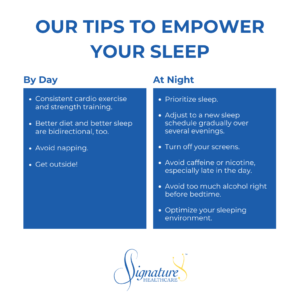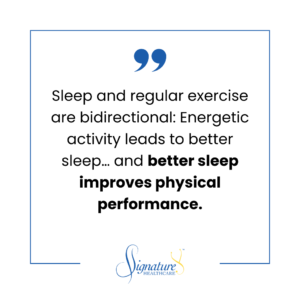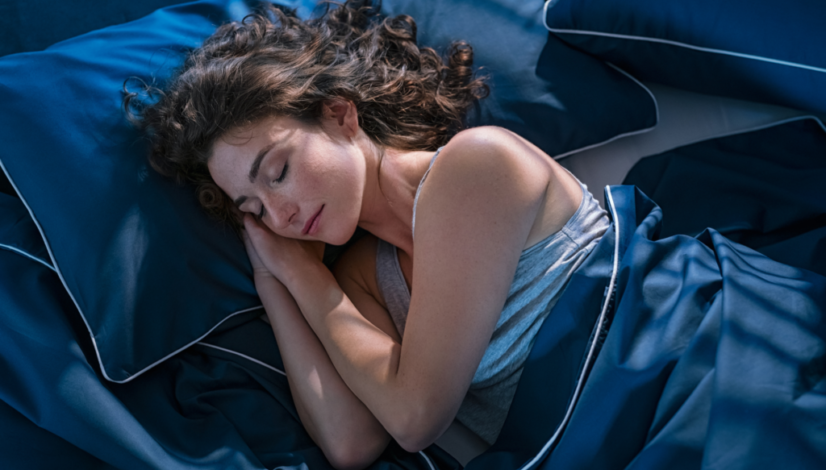Empower Your Sleep: Essential Tips for a Restful Night
Did you wake up tired today? Is it sometimes hard to believe you got a good night’s sleep? That’s likely because… you didn’t.
It’s a common issue. Many of us struggle to achieve optimal sleep.
But when lack of sleep becomes a vicious cycle, it has ill effects. It increases stress hormones like cortisol, which can cause irritability and anxiety. Additionally, it can impair decision-making abilities and cognitive function.
If you’re anxious, depressed, bipolar, or have a stress disorder, finding good sleep is especially challenging. And when it does come, you may still toss and turn or awaken frequently. (Some people even experience hypersomnia, a tendency to sleep too much or doze off at inappropriate times.)

Our Tips to Empower Your Sleep
We have a few tips to help you maintain good sleep hygiene and consistently get your recommended seven to nine hours of sleep:
By Day
- Consistent cardio exercise and strength training (repetitions with weights) can effectively reduce your anxiety level and deliver many other health benefits — all promoting great sleep. Sleep and regular exercise are bidirectional: Energetic activity leads to better sleep… and better sleep improves physical performance. One caveat: Try to exercise in the morning or afternoon — too much exertion right before bed can interfere with sleep.
- Better diet and better sleep are bidirectional, too. Focus on getting a balanced diet. At dinner or late in the day, avoid eating spicy foods that may cause gastrointestinal distress when lying down.
- Avoid napping. In Latin America and Spain, siesta culture lets nappers recharge effectively. But in North America, we keep naps to 30 minutes or less, no later than early afternoon, to encourage a night of restful sleep.
- Get outside! Exposure to natural light effectively regulates your sleep/wake cycle.
At Night
- Prioritize sleep. Schedule yourself to go to bed and wake up at around the same time every day.
- Adjust to a new sleep schedule gradually over several evenings. If you’re a poor sleeper who retires after midnight each night, it won’t work to suddenly switch your bedtime to 9:30 pm.
- Turn off your screens. Don’t use electronic devices — TV, cellphone, computer — before bed. Instead, relax, unwind, and reduce stress with guided breathing or mindful meditation techniques.
- Avoid caffeine or nicotine, especially late in the day. They adversely affect sleep.
- Avoid too much alcohol before bed. Although a few drinks help some people snooze quickly, alcohol significantly interferes with sleep cycles and sleep quality throughout the night.
- Optimize your sleeping environment:
- Choose a comfortable mattress, pillows, and bedding.
- Darken sleeping quarters at bedtime. Blackout shades or an eye mask can help.
- Maintain a quiet environment, perhaps keeping pets and kids out of the room if they interrupt slumber. Also, calming music or a sound conditioner (white, green, or brown noise) may help you nod off.
- Keep your sleeping area cool, ideally 65–72 degrees.
- Aromatherapy — soothing smells like lavender or bergamot — may also help relax you.

Sleep Facts From Other Cultures
Here are a few fascinating sleep facts from around the world:
- A survey of 30 countries found that adults in Korea and Japan have the shortest average sleep cycle: seven hours and 50 minutes.
- People in countries with a higher GDP tend to go to bed later than people in more depressed economies.
- People in countries with higher individualism scores (like the U.S.) tend to sleep longer.
- In non-Western cultures, families often strengthen their bonds by sleeping with their young children or in multi-generational groups.
- Many cultures prefer minimum bedding material — for instance, the Japanese believe a very thin mattress promotes better posture.
- Scandinavians take a minimalist approach, ensuring their sleeping areas are simple, uncluttered, and dust-free.
- Before the advent of air conditioning, siesta in Spain and Latin America allowed people to rest during the hottest part of the day: the afternoon. Even today, naps are part of the culture — stores close for a few hours at midday and stay open later in the evening.
- Japan loves the power nap, inemuri — literally, “to be present while sleeping.” Inemuri is considered a sign of a hard worker. The Japanese will power nap for 15 or 20 minutes on public transportation, even at their desk at work.
- Tibetan monks practice dream yoga, a progression toward subtle awareness even in deep sleep.
Avoid a “Quick Fix”
Patients who want to empower their sleep sometimes come to us hoping for a “quick fix” prescription. However, medication can cause dependency or addiction.
Instead, our first step is to discover what’s causing their inefficient or unrestful sleep.
We discuss their sleep hygiene — bedtime practices, sleep schedule — and daytime lifestyle. We ask if they have trouble falling asleep or awaken too early and can’t get back to sleep. Maybe they wake up several times a night — frequent voiding is common in patients with diabetes, prostate enlargement, or overactive bladder.
By properly managing root causes, we can often improve someone’s sleep as well.
I generally avoid prescribing “quick fix” medications like Ambien (zolpidem) or Valium and Xanax (benzodiazepines). They don’t improve sleep architecture and can have harmful side effects, including dependency or addiction.
To get a patient back on track with a good sleep cycle, I may temporarily recommend a naturopathic supplement or even a mild allergy medication to promote drowsiness.
Studying Sleep
Historically, we often conducted a sleep study to measure apnea, snoring, and sleep stages for a patient with a history of snoring or apneic episodes.
Traditionally, in most sleep studies, a patient would report to a lab and sleep with equipment attached to their scalp and other parts of their body. The study would indicate if they had sleep apnea and required an oral appliance or a CPAP machine to sleep better, and we’d simply provide the patient with a prescription for the appropriate device.
However, these studies don’t necessarily tell us if the patient might benefit from other interventions. And we wondered if we might better study patients where they’re more comfortable — their home environment.
Empower Sleep: Not Your Traditional Sleep Study
When we treat sleep disorders, we like to personalize our approach to the individual. Recently, I discovered Empower Sleep, a California-based sleep medicine practice with a science-backed program individualized for healthier sleep.
Empower Sleep allows patients to participate virtually in a sleep study by collecting personal sleep data in the comfort of their home. During sleep, the patient wears a large ring that measures multiple parameters — pulse oximetry, sleep depth, sleep architecture — and can detect sleep apnea. The sleep ring collects information over weeks or months, not just for a couple of days like traditional labs or even more traditional home studies.
I work with patients to adjust their daily and nighttime routines based on what we learn from the ring. If we modify their regimen — decreasing alcohol, stopping naps, increasing exercise — the ring gives us immediate feedback on whether it helped them sleep better. The Empower Sleep team provides excellent advice as well.
The Empower ring can also indicate whether a patient’s CPAP machine works well. For people with mild to moderate sleep apnea, some data suggests an oral appliance that keeps the mouth open may effectively reduce apneic episodes. Other data supports a new lip-taping method, which can improve a patient’s sleep by up to 10% with fewer apneic episodes.
While a traditional sleep study or consultation with a sleep specialist can take weeks to arrange, we can generally set up consultations for our patients quickly with Empower Sleep.
Encourage and Empower Your Sleep
Tired of being tired? Our Signature Healthcare physicians can help you get more restful, refreshing sleep. It’s a critical focus: The pathway to good sleep brings you better health and wellness overall.
Before you spend another sleepless night, let’s talk.

Dr. Jordan Lipton
Dr. Jordan Lipton, a distinguished physician with dual board certification in emergency and ambulatory medicine, co-founded Signature Healthcare and is renowned for his contributions to medical literature and international lectures. Balancing his professional achievements with personal interests, he enjoys squash, skiing, art, and cooking, alongside his wife, Dr. Siu Challons-Lipton, and their two grown children.

